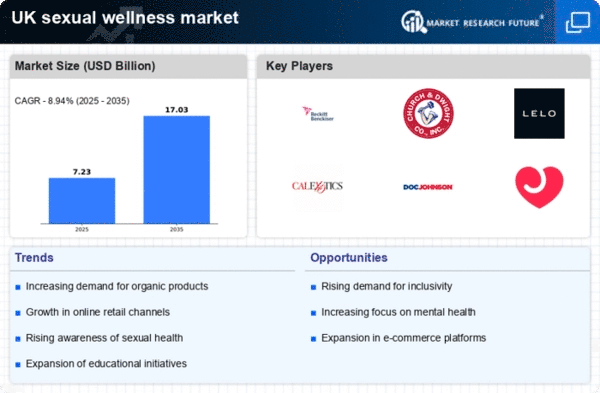Regulatory Changes and Improved Accessibility
Recent regulatory changes in the UK have improved the accessibility of sexual wellness products, acting as a significant driver for the market. The removal of certain restrictions has allowed for a broader range of products to be sold in mainstream retail outlets. This shift is reflected in market data, which indicates a 25% increase in sales through pharmacies and supermarkets. As consumers gain easier access to these products, the sexual wellness market is expected to experience continued growth, as more individuals feel empowered to purchase items that enhance their sexual health.
Expansion of Product Offerings and Innovations
The sexual wellness market is witnessing an expansion of product offerings and innovations, which serves as a crucial driver for growth. Companies are increasingly introducing diverse products, including organic and vegan options, catering to a wider audience. Market data shows that the introduction of innovative products has led to a 20% increase in sales within specific segments. This trend indicates that as consumers become more discerning, they are likely to seek out products that align with their values and preferences, thereby propelling the sexual wellness market forward.
Growing Acceptance of Sexual Wellness Products
The increasing acceptance of sexual wellness products among the UK population is a notable driver for the sexual wellness market. As societal norms evolve, individuals are more open to discussing and purchasing products that enhance sexual health and pleasure. This shift is reflected in market data, indicating a growth rate of approximately 15% annually in the sector. The rise in acceptance is particularly pronounced among younger demographics, who prioritize sexual health and well-being. This trend suggests that the sexual wellness market is likely to continue expanding as more consumers seek to improve their intimate lives without stigma.
Increased Focus on Mental Health and Well-being
The growing emphasis on mental health and overall well-being has a significant impact on the sexual wellness market. Consumers are increasingly recognizing the connection between mental health and sexual satisfaction, leading to a surge in demand for products that promote both. Research suggests that approximately 40% of individuals in the UK report that improved mental health positively affects their sexual experiences. This awareness is likely to drive the market as consumers seek products that not only enhance physical pleasure but also contribute to emotional and psychological well-being.
Influence of Social Media and Online Communities
Social media platforms and online communities play a pivotal role in shaping perceptions around sexual wellness. The sexual wellness market benefits from the visibility and discussions fostered by these platforms, which encourage open dialogue about sexual health. Data indicates that around 60% of consumers in the UK have been influenced by social media when considering sexual wellness products. This influence is particularly strong among millennials and Gen Z, who actively engage with content related to sexual health. As these platforms continue to grow, they are expected to further drive the sexual wellness market by normalizing conversations around intimacy.
















